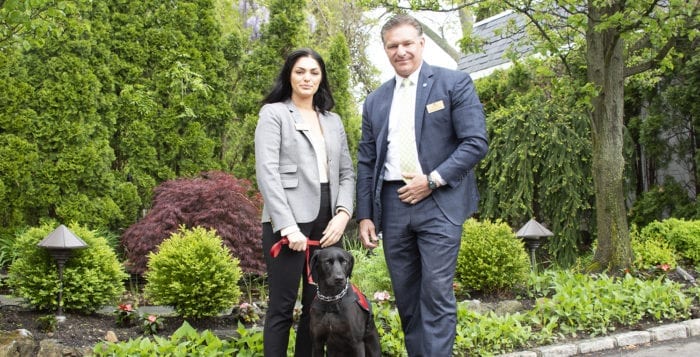
By Chris Mellides
Joined by his closest family, an elderly man sits amid a solemn ceremony, overcome with sadness over the loss of his wife of 72 years.
The 94-year-old World War II veteran pauses during service at the Moloney Funeral Homes’ Center Moriches location long enough to spot a Labrador-Weimaraner mix named Kota, who slowly approaches him.
Peter Moloney, owner of the funeral homes and Kota’s personal handler, gives the grieving man a treat for Kota, which the docile dog gladly accepts before gently resting his head in the man’s lap.
“The man came into the funeral home with his family and his daughter and he was brokenhearted at the loss of his wife,” Moloney said. “Kota provided him with a sense of comfort and he was very appreciative.”

The owner explained the thought process behind having Kota on-hand in the right situations.
“Pets are known to reduce stress and anxiety and take people to another dimension in the grief process,” he said.
Moloney’s daughter, Erin, rescued the dog while she was studying at the University of Arkansas, and when Kota was introduced to the family one Thanksgiving Erin’s father knew that Kota would be a perfect candidate as a therapy dog.
Aptly nicknamed “Kota the Comfort Dog,” the young canine travels with Moloney wherever he is needed and has made appearances with his owner across all seven family run funeral homes located throughout Suffolk County, including in Port Jefferson Station.
“He’s a wonderful companion and he’s provided tremendous comfort to families that have encountered him that have a fondness for pets,” Moloney said. “He’s not for everybody, and I would never introduce him to a family without at least having some type of conversation surrounding pets and animals. We would not want to invade someone’s privacy [who] perhaps was afraid.”
While Kota is currently the only certified therapy dog to be used for support in funeral homes on Long Island, according to Moloney, dogs like him have long since been used for similar purposes.
Therapy dogs have been implemented for those in need of comfort as far back as the 1700s, primarily for those people suffering from mental health problems, said Mary Burch, American Kennel Club spokesperson and director of the Canine Good Citizen program, which is used as a prerequisite for many groups that use therapy dogs.
“In the 1970s there were several large organizations that registered therapy dogs and currently, there are hundreds of organizations across the country that register therapy animals,” Burch said.
The AKC spokesperson said facilities tend to contact therapy dog organizations that have “tested dogs and determined where they are best placed.”
A quiet toy breed might be better utilized in a hospital setting where it can be placed on a bed, while larger sporting breeds might do well in a residential program for teenage boys, according to Burch.
“He loves to be petted and he’s very obedient. So, with those characteristics, I felt that he was a very good candidate to assist families within our funeral homes in providing comfort.”
— Peter Moloney
“In a funeral home, a dog would be needed that can provide comfort while remaining under control in this quiet setting where people are upset and in emotional pain,” she said.
Moloney said he saw the success funeral homes throughout the country have had when employing therapy dogs and that a friend in Milwaukee, Wisconsin, used a grief therapy dog with triumphant results, so Moloney thought he’d try to do the same on Long Island.
Kota is certified through Sublime K9 Dog Training, a Wantagh-based organization that among other things, provides dog obedience training and therapy dog services.
“He’s been certified and has passed the test, an obedience test, and needs to be calmer in crowds and he’s passed all of those requirements,” Moloney said. “Kota gets groomed on a regular basis so he’s clean and he’s very well maintained and he has all of his shots. We keep him up to date of course.”
Anne Moyer, associate professor in the Department of Psychology at Stony Brook University, said while more conventional forms of therapy generally involve interaction with a skilled professional, there is evidence suggesting animal interaction can be beneficial.
“Animals are considered useful as facilitators because they create a sense of safety, perhaps because they are nonjudgmental and do not require verbal interactions to connect with,” Moyer said. “Humans form emotional bonds and attachments to animals and these can be therapeutic.”
Kota has been visiting Moloney Family Funeral Homes where he has provided comfort since February and will typically work with families for 20 minutes at a time. Moloney said he is confident his dog will become a fixture at his funeral homes for the foreseeable future.
“Some people have aversions to pets so you know we’re very careful with our approach in introducing him to families,” Moloney said. “But he loves to be petted and he’s very obedient. So, with those characteristics, I felt that he was a very good candidate to assist families within our funeral homes in providing comfort.”






